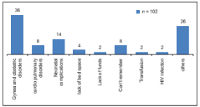Profile and Outcome of Primary Health Workers’ Referrals in a Cosmopolitan State in Nigeria
Main Article Content
Abstract
Background: Referral system is any process in which healthcare providers at lower levels of the health system seek the assistance of providers who are better equipped or specially trained to guide them in managing or to take over responsibility for a particular episode of a clinical condition in a patient.
Objective: To evaluate the profile and outcome of referrals from primary healthcare levels.
Materials and Methods: This was a descriptive cross-sectional study undertaken with the aid of a structured questionnaire administered to all referred pregnant mothers and parents of children at three General Hospitals and one tertiary hospital.
Results: Nearly all the participants were informed about the reason for their referral. Four‑fifths of the participants were not accompanied by a health worker, whereas 90% were not expected on arrival. About 80% of the participants went to the referred hospital on the same day. The most common mode for transporting referred patients was public bus followed private vehicle.
Conclusion: Although there are good practices with regard to referred patients being informed about the reason for their referral, work is still pending to ensure that the referral systems are effectively functioning in the referring of patients from primary health facilities.
Downloads
Article Details
Section

This work is licensed under a Creative Commons Attribution-NonCommercial-ShareAlike 4.0 International License.
How to Cite
References
Health Reform Foundation of Nigeria. History of the Nigerian health sector. Nigeria Health Review; Abuja: 2006. HERFON; 2006. p. 1-13.
FMOH. Revised National Health Policy. Federal Ministry of Health; Abuja: 2004. p. 5-17.
Müller VT, Gomes Mda M. Questionnairestudyof primary care physicians’ referral patterns and perceptions of patients with epilepsy in a Brazilian city, 2005. Rev Panam Salud Publica 2007;22:67-74.
Dunmade AD, Afolabi OA, Eletta AP. Challenges of Otolaryngologic Referral in a Nigerian Tertiary Hospital: An Audit. East and Central African J Surg 2010;15:87-92.
Afsar HA, Younus M. Patient referral at the grass-roots level in Pakistan. Nat Sci; 2:2004.
Imison C, Naylor C. Referral Management: Lessons for Success. London: King’s Fund; 2010. Available from: www.kingsfund.org.uk/publications/referral_management.html. [Last accessed on 2016 Dec 05].
Oyedeji GA. Socio-economic and cultural background of hospitalized children in Ilesha. Niger J Paediatr 1985;12:111-7.
Macintyre KCE, Littrell M, Hotchkiss DDR, Mndzebele S, Nkambule R, Gumbi S et al. Barriers to referrals in Swaziland: Perceptions from providers and clients of a system under stress. World Medical and Health Policy 2011;3:1-29
Awoonor-Williams JK, Bailey PE, Yeji F, Adongo AE, Baffoe P, Williams A, et al. Conducting an audit to improve the facilitation of emergency maternal and newborn referral in northern Ghana. Glob Public Health 2015;10:1118-33.
O’MalleyAS, Reschovsky JD. Referral and consultation communication between primary care and specialist physicians. Arch Intern Med 2011;171:56-65.
Hofman JJ, Dzimadzi C, Lungu K, Ratsma EY, Hussein J. Motorcycle ambulances for referral of obstetric emergencies in rural Malawi: Do they reduce delay and what do they cost? Int J Gynaecol Obstet 2008;102:191-7.
Simba DO, Mbembati NAA, Museru LM, Lema LEK. Referral pattern of patients received at the national referral hospital: Challenges in low income countries. East Afr J Public Health 2008;5:6-9.
Tayler‑Smith K, Zachariah R, Manzi M, Van den Boogaard W, Nyandwi G, Reid T, et al. An ambulance referral network improves access to emergency obstetric and neonatal care in a district of rural Burundi with high maternal mortality. Trop Med Int Health 2013;18:993-1001.






